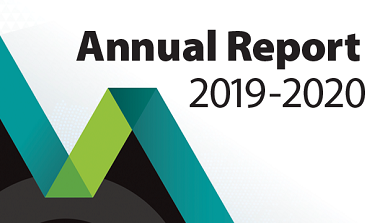Table of Contents
- MESSAGE FROM THE DEPUTY VETERANS OMBUDSMAN
- OUR TEAM: ADVANCING FAIRNESS FOR CANADA’S VETERANS
- OUR WORK: SUCCESS STORIES
- OUR WORK: OUR CLIENTS
- OUR WORK: INVESTIGATING SYSTEMIC ISSUES
- OUR WORK: SHARING, LISTENING & CONNECTING
- FACE-TO_FACE ENGAGEMENTS:
- VETERANS OMBUDSMAN COMMENDATION AWARDS
- VETERANS OMBUDSMAN ADVISORY COUNCIL (VOAC)
- FINANCIAL STATEMENT
Message from the Deputy Veterans Ombudsman
I am pleased to share with you the Office of the Veterans Ombudsman’s (OVO) accomplishments, through the pages of this annual report, which covers the period from April 1, 2019 to March 31, 2020. Achieved together with our 32 OVO employees, this work is part of the OVO’s multi-year commitment to evaluate and improve how the office connects with, and provides services to, Veterans and their families.
This year’s highlight was the adaptability and responsiveness the OVO team demonstrated during those very early days of the global health crisis. Eleven months into this highly productive year, the COVID-19 pandemic abruptly altered everyone’s reality. Swiftly, our team rallied to work remotely and keep services operating in the face of uncertainty. Concurrently, the Veterans Ombudsman announced his departure and here too, the team adjusted, working to support this transition. This year underscored the important role each team member plays ensuring that the office operates effectively and that we are able to perform, to the best of our abilities, the critical job of advancing fairness for Veterans and their families - regardless of the challenges.
What We Accomplished
The office continued to receive a high volume of complaints related to Veteran’s health supports and the wait time associated with disability benefit application decisions. To improve the prioritization of complaints the OVO instituted a dedicated intake team, as part of a new structure for its front line services. Our service continued to improve, with 89 per cent of inquiries being responded to in 60 days, exceeding our service standard. The OVO made the commitment to start publishing investigative summaries of individual complaints and VAC’s response to these later in 2020 on the OVO website. A new fairness model was adopted and sessions were delivered to improve VAC officials’ understanding of how OVO applies fairness to its investigations.
News media coverage during this period included the Ombudsman’s call for a national conversation concerning outcomes for Veterans, the need for VAC to demonstrate a plan to tackle wait times connected to disability pension applications and also raised concerns about changes to mental health supports for Veterans’ families. A mid-year re-think of the office’s digital engagement strategy led to 10 per cent growth in followers across OVO social media channels and 24 per cent increase in web site traffic. And the Communications directorate launched the Focused on Fairness e-newsletter to keep the Veterans community more aware of the office’s activities.
The OVO also published its first micro-investigation – a new type of report which examines complaints that could impact multiple people but not on the same scale as required by a systemic investigation. The Income Replacement Benefit for Reserve Force Veterans shone a light on an unfair financial outcome for some Reserve Force Veterans based on how benefits are calculated.
This year’s highlight was the adaptability and responsiveness of the OVO team demonstrated during those very early days of the global health crisis. Eleven months into this highly productive year, the COVID-19 pandemic abruptly altered everyone’s reality.
Looking Forward
Given our commitment to continuous improvement, the OVO will enhance our business processes while also responding to recommendations outlined in the VAC Evaluation Report (August 2020). For example, we will digitize our services, making the OVO experience more user-friendly for both team members and clients, and enhance employee training. Additionally, the Intervention Directorate is expanding its communications with clients through written correspondence so that investigation results are more understandable.
With respect to investigations of systemic issues, we will continue to conduct research and analysis and make recommendations to address gaps in programs and services that may have an unfair impact on Veterans and their families. The OVO will look at issues from the perspective of those in the Veterans’ community whose experiences may have been previously overlooked with respect to these (VAC programs and services). Our efforts here will include: consideration for family members of Veterans; applying a lens of Women and Indigenous Veterans; and assessing the robustness of VAC’s Gender-based Analysis Plus effort.
As the Deputy Veterans Ombudsman, it is my pleasure to provide a stewardship role to the OVO as we prepare to welcome a new Ombudsman. I’d like to thank former Veterans Ombudsman Craig Dalton for his leadership and vision which has made a strategic impact on our work. And lastly I wish to once again share my appreciation to the entire OVO team for their efforts to provide the best service possible to Veterans and their families, no matter what the circumstances.
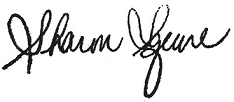
OUR TEAM: ADVANCING FAIRNESS FOR CANADA’S VETERANS
About Our Organization:
- Veterans Ombudsman
- Deputy Veterans Ombudsman and Executive Director
- Intervention and Corporate Services Directorate
- Strategic Review and Analysis Directorate
- Communications Directorate
We are committed to the work we do for Veterans and their families. With offices in Charlottetown, PEI, and the National Capital Region, even the COVID-19 pandemic did not slow our team of 32 employees down. Although we began working from home in March 2020, we continued our important efforts via uninterrupted frontline services to individual Veterans and their families, investigations of systemic issues, and virtual outreach and engagement activities.
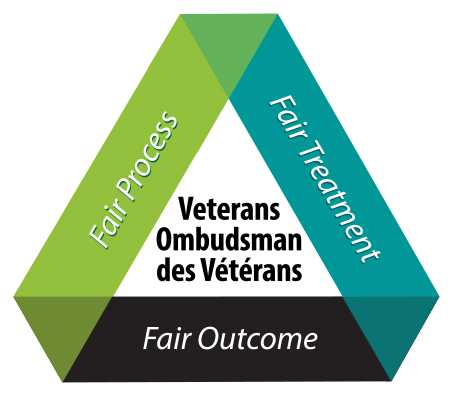
Our focus is on fairness for Veterans and their families. Fairness is the foundation for the work we do. It is the lens through which we view every complaint and every issue. It is the essence of our ombuds work.
- Sharon Squire, Deputy Veterans Ombudsman
OUR WORK: SUCCESS STORIES
A Fair Calculation: OVO Helps a Reserve Force Veteran Get Fair IRB Payments
After spending almost three years trying to get Veterans Affairs Canada (VAC) to correct her Income Replacement Benefit (IRB) payments, believing she was receiving less than she was entitled to, a Reserve Force Veteran decided to reach out to the Office of the Veterans Ombudsman (OVO).
The IRB is a monthly payment providing income support to Veterans experiencing service-related barriers to re-establishment. If eligible for the IRB, VAC states that Veterans will receive 90 per cent of their salary upon release from the Canadian Armed Forces.
The Reserve Force Veteran’s monthly payments were much less than she had anticipated. According to the VAC decision letter her IRB had been calculated in accordance with the regulations, using the salary from a previous, lower rank she had held during her service.
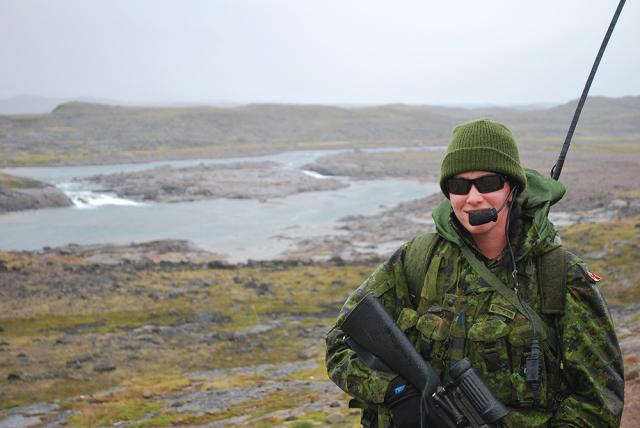
The Veteran believed that VAC was incorrectly interpreting and applying the regulations. In hopes of correcting the suspected mistake, she had appealed the decision twice; however, the decision was maintained each time, her questions went unanswered, and the reasoning behind the unfavourable decisions remained unclear.
The OVO assessed her case and got to the bottom of the problem. Although the Reserve Force Veteran had multiple conditions approved for rehabilitation, VAC used only one condition (associated with an earlier period of service 20 years prior) to calculate her IRB. If the other conditions associated with her pre-release salary were taken into account, the IRB would have been much higher.
When we presented this case, VAC overturned the decision, recalculated the monthly IRB at $1,000 higher and issued a $30,000 retroactive payment.
It was an enormous relief when I received the overturned decision. I actually sat down and cried with relief and felt I could finally focus on my health and start eliminating the stressors in my life caused by this financial uncertainty about my future.
This complaint led the OVO to launch a micro-investigation into how the IRB is calculated. The investigation determined that the IRB for some Reserve Force Veterans is calculated using a lower salary than the salary on release. To ensure Reserve Force Veterans do not face unfair outcomes related to their IRB calculation, the OVO recommended that Government revise regulations and apply a Reservist lens when developing policy.
Putting Health and Wellness First: Recognizing Both Physical and Mental Injuries
A Veteran was denied services through the Veterans Independence Program (VIP) because their injuries were psychological rather than physical. They contacted the Office of the Veterans Ombudsman (OVO) for assistance.

The Veterans Independence Program (VIP) provides funding for services such as grounds maintenance, housekeeping and meal preparation. Most often, these services are approved when the applicant is not able to do these activities because of physical limitations. In this case, the Veteran was physically able to mow his lawn and clean his house, but his psychological injuries affected his ability to function and manage such daily affairs.
Our office acted as soon as the Veteran reached out to us. From the onset of the investigation, it was clear to the OVO Issues Analyst that the denial of benefits was unfair as it ignored the Veteran’s psychological needs. Our analyst developed a rationale for overturning the decision and assisted the Veteran with both levels of appeal, the second of which produced the result they deserved - access to the needed VIP services.
A Step in the Right Direction: A Veteran’s Complaint Leads to a Policy Reminder for VAC
A Veteran who had been using a cane, paid for by Veterans Affairs Canada (VAC), was told by the department that a new prescription would be needed for a replacement. They contacted the Office of the Veterans Ombudsman (OVO) for assistance.
This Veteran acquired a cane due to serious and permanent back and knee injuries. After 10 years of use, it was time for the cane to be replaced. The Veteran assumed that VAC would cover the cost of the replacement. Instead, the department advised them they would need a new prescription in order to demonstrate their doctor recommended the new cane. To get a new prescription, this mobility-impaired Veteran would need to invest time and energy to travel more than 60 kilometers to their physician’s office.

One of our Issues Analysts (IA) studied VAC’s policies relating to Aids for Daily Living (ADL). The IA found a policy stating that prescriptions for a basic aid are not necessary, if the aid will increase independence and stabilize the Veteran’s ability to access these aids. The IA determined the Veteran was unfairly treated and asked VAC to authorize the replacement. VAC contacted its Claims Administrator requesting that the prescription requirement be waived and planned to advise the VAC Area Office they had the authority to override the requirement, when appropriate.
By this time, the Veteran had already visited their doctor for a prescription. Yet, by helping VAC better understand its own policies, our assessment and resolution will benefit future Veterans who may be in the same situation.
OUR WORK: OUR CLIENTS
The Intervention Directorate is the Office of the Veterans Ombudsman’s (OVO) frontline team. Veterans and their families have the right to a fair and timely review of their complaints regarding the programs, services and supports delivered by the Veterans Affairs portfolio. When all avenues within VAC have been exhausted, individuals can turn to us for help. Our intervention starts with a review of the complaint through a fairness lens:
- Was the Veteran or family member treated fairly?
- Was the process fair?
- Was the outcome fair?
We investigate to determine if the Veteran or family member has been treated unfairly. If so, we seek resolution. The outcome not only brings closure to the case but often initiates changes to VAC policies and processes.
What Happens When You Submit a Complaint?
Alternative text
1. Submission: You submit your complaint and provide consent for the OVO to access your VAC file
2. Review: It is reviewed and all information necessary to assess the complaint is gathered
3. Investigation: If the complaint falls within the OVO’s mandate, the OVO will conduct an evidence-based investigation into fairness
4. Resolution: If unfairness is discovered, the OVO will work with VAC to attempt to resolve the issue
5. Escalation: If the complaint is not resolved at the VAC working level, the OVO may escalate the case to VAC’s Deputy Minister or Minister
Our Intervention Directorate embraces ongoing improvement with the aim to enhance the services that we can provide to Veterans and their families. Over this past year, we changed the team composition, restructured our intake process and provided additional training and professional development for our team. As a result, we were able to exceed our service standard of addressing 75 per cent of cases within 60 days. We fully addressed 89 per cent of files within that timeframe, compared to 68 per cent in the previous two years.
Intervention by the Numbers 2019-2020
Alternative text
Requests for Information and Complaints: 1,916
Complaints: 1,687 + Requests for Information: 229
Of the 1,687 Complaints:
- Within OVO Jurisdiction: 1,596
- Outside OVO Jurisdiction (Information and Referrals provided): 91
Of the 1,596 within OVO Jurisdiction:
- Cases Referred to VAC: 653
- Opened for Investigation: 943
Of the 943 Opened for Investigation:
- Assessed as Unfairly Treated: 605
- Assessed as Fairly Treated: 310
- Remain Under Investigation: 28
Clients by Region:
Alternative text
- Yukon: 2
- Northwest Territories: 3
- Prince Edward Island: 11
- Outside Canada: 16
- Saskatchewan: 22
- Newfoundland and Labrador: 25
- Manitoba: 46
- Unknown: 68
- New Brunswick: 113
- Nova Scotia: 131
- Alberta: 132
- British Columbia: 156
- Quebec: 292
- Ontario: 371
Clients by Category:
Alternative text
- Former Regular Force Member: 833
- Serving Regular Force Member: 158
- Former Reserve Force Member: 109
- Unknown: 100
- Family/Survivor: 52
- Former RCMP Member: 46
- Serving Reserve Force Member: 21
- Traditional Veteran: 20
- Allied Veteran: 11
- Civilian: 8
- Serving RCMP Civilian Member: 2
- Former RCMP Civilian Member: 1
- Merchant Marine: 1
Demographics by Age & Gender:
Alternative text
Total Clients: 1,388
Age 20-29, 21 Males, 3 Females, 2 Unknown, Total = 27
Age 30-39, 202 Males, 27 Females, 29 Unknown, Total = 258
Age 40-49, 212 Males, 43 Females, 33 Unknown, Total = 288
Age 50-59, 277 Males, 54 Females, 44 Unknown, Total = 375
Age 60-69, 117 Males, 20 Females, 12 Unknown, Total = 149
Age 70-79, 18 Males, 8 Females, 7 Unknown, Total = 63
Age 80-89, 31 Males, 2 Females, 0 Unknown, Total = 33
Age less than 90, 20 Males, 7 Females, 7 Unknown, Total = 34
Age Unknown, 81 Males, 32 Females, 48 Unknown, Total = 161
All Totals, 1009 Males, 197 Females, 182 Unknown, Total = 1388
OUR WORK: INVESTIGATING SYSTEMIC ISSUES
In addition to assessing and investigating client complaints, the Office of the Veterans Ombudsman (OVO) shines a spotlight on systemic issues related to VAC programs and services. Sometimes repeat complaints indicate a gap in, or issue with, VAC programs and services. Stakeholder outreach activities reveal other issues. Yet other systemic issues become obvious through our review and analysis of VAC’s services and programs for Veterans and their families.
The Strategic Review and Analysis (SRA) Directorate initiates reviews, and conducts studies and produces reports to support recommendations to government with the goal of advancing fairness for Veterans and their families. Recently, the SRA Directorate has launched several micro-investigations, including two in 2019-2020, to enable a faster turnaround on time-sensitive and systemic issues. These investigations and our findings are essential to the OVO’s overall aim of promoting fairness.
Publications
Income Replacement Benefit Calculation for Reserve Force Veterans (February 2020)
In February, the OVO released its first micro-investigation report. Launched in response to complaints from Reserve Force Veterans claiming that they were receiving a lower IRB payment than they had expected, the investigation examined how Veterans Affairs Canada (VAC) calculates the IRB payment. We concluded that calculating Income Replacement Benefits for Regular Force Veterans based on their salary at release and for Reserve Force Veterans based on their salary at the time of injury results in an unfair outcome for Reserve Force Veterans who were injured while serving in a lower class and at a lower income than when they released. We made two recommendations for government to address the issue, including a regulatory change and applying a Reserve Force lens when developing policy.
Spouses Supporting Transition Poster (October 2019)
The OVO presented a poster at the Canadian Institute for Military and Veterans Health Research 2019 Forum as part of its Spouses Supporting Transition project which outlines the lived-experiences of spouses of Veterans that reported successfully transitioning from military to civilian life. Overall, the project found that providing proactive mental health services to military members/Veterans and their families throughout transition would have benefited many of the participants and their families.
Veterans’ Ombudsman Report Card 2019
The OVO Report Card tracks and reports the response to recommendations made by the Ombudsman to the Minister of Veterans Affairs. The 2019 Report Card informed that over a 10 year period (2009-2019) 50 out of 63 of the OVO’s recommendations – or 79 per cent were implemented or partially implemented. The 13 outstanding recommendations concern: health care and supports (8); Veterans’ service experience (4); and financial security (1).
We approach every investigation and report with the goal of making positive changes for Veterans and their families. Without this work, we would not be able to make recommendations to government and policy makers.
- Sharon Squire, Deputy Veterans Ombudsman
OUR WORK: SHARING, LISTENING & CONNECTING
Staying connected to the realities of Canada’s Veterans, their families and stakeholder groups helps shape the Office of the Veterans Ombudsman’s (OVO) work. The office used a mix of face-to-face and virtual engagement in 2019-2020 to educate a variety of audiences about the OVO’s services and to listen for the issues impacting Veterans and their families.
To foster even greater connections virtually, the OVO expanded its presence on social media platforms and launched a quarterly online newsletter ‘Focused on Fairness’.
Alternative text
WEB SITE VISITS in 2019-2020: 54,207
Site visits increased by 13,272 visits which equals 24 per cent growth
SOCIAL MEDIA FOLLOWERS in 2019-2020
- 5,951 Facebook fans, which increased by 271 new fans or 4.5 per cent
- 3,121 Twitter followers, which increased by 221 new followers or 7 per cent
- 560 Instagram followers, which increased by 469 new followers or 84 per cent
FACE-TO-FACE ENGAGEMENTS:
In 2019-2020, Veterans Ombudsman Craig Dalton continued his outreach work across Canada, meeting with various Veterans groups, stakeholders, and decision makers. Mr. Dalton connected with parliamentarians, RCMP Veterans, Women Veterans, Canadian Armed Forces units, academia, medical professionals, and organizations supporting Veterans and their families. Mr. Dalton heard about the different experiences and perspectives on matters concerning Veterans and their families. The insights that these engagements provided helped to shape new OVO priorities for systemic investigations and inspired ideas on how to broaden our reach into the Veterans community.
Alternative text
Meetings with Veterans and Organizations: 109
Provinces Visited: 7
Major Stakeholder Meetings: 2
Parliamentary Committee Appearances: 2
Most Popular Social Media Posts
Most Popular English and French Posts, Combined: November 26, 2019
Reach: 12,949
Engagements: 2,282
Alternative text
Most Popular English and French Posts, Combined: November 26, 2019
- Reach: 12,949
- Engagements: 2,282
Most Popular English Post: June 10, 2019
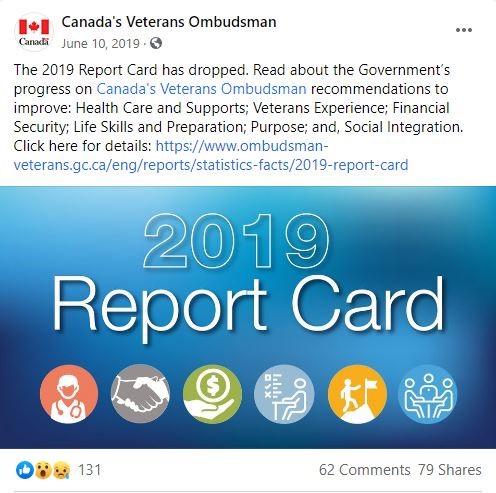
Reach: 10,118
Engagements: 1,751
Alternative text
Most Popular English Post: June 10, 2019
- Reach: 10,118
- Engagements: 1,751
Most Popular French Post: June 4, 2019

Reach: 1,234
Engagements: 204
Alternative text
Most Popular French Post: June 4, 2019
- Reach: 1,234
- Engagements: 204
VETERANS OMBUDSMAN COMMENDATION AWARDS
The annual Commendation Awards honour outstanding individuals and groups working to improve the lives of those in the Veterans community. Nominated by their peers, reviewed by the Veterans Ombudsman Advisory Council and selected by the Ombudsman, they exemplify the true meaning of commitment to a cause and selfless hard work.
2019 Recipients
Lifetime Contribution
Ken Reimer
Luc O’Bomsawin (1957 - 2019)
Joseph Paquette (1950 - 2020)
Individual Contribution
Patrice Bergeron
Richard Nicholson
Local Organization
Great War Centenary Association
National Organization
Wounded Warriors Canada
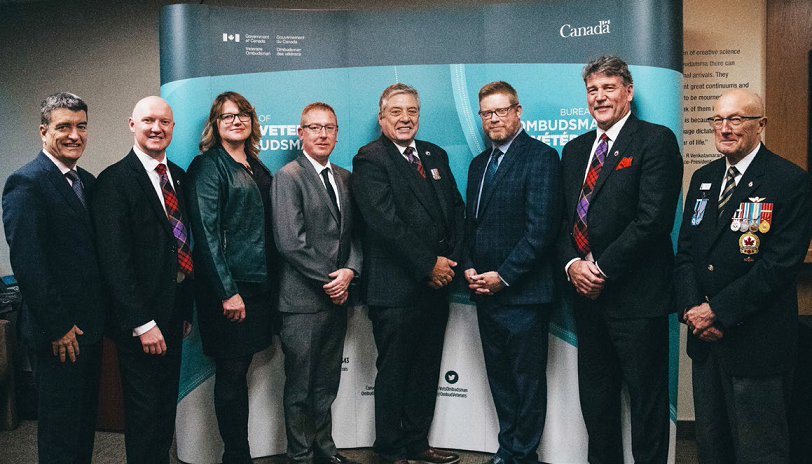
Alternative text
Photo of Recipients at event with names listed below:
From left to right: Patrice Bergeron, Scott Maxwell (Executive Director, WWC), Meghan Cameron (Treasurer, GWCA), Geoffrey Moyer (Presidentt, GWCA), Philip C. Ralph (Director of Health Services, WWC), Craig Dalton (former Veterans Ombudsman), Richard Martin (Chairman, WWC) and Richard Nicholson.
These outstanding recipients were nominated by their peers and selected for a Veterans Ombudsman Commendation because of the positive and lasting change they make within the Veterans community. Their leadership and dedication to their work inspires others to make a difference in the lives of Veterans and their families.
- Craig Dalton, Veterans Ombudsman (former)
VETERANS OMBUDSMAN ADVISORY COUNCIL (VOAC)
VOAC provides advice to the Veterans Ombudsman on matters related to the Office of the Veterans Ombudsman’s (OVO) mandate. VOAC members represent Veterans, families and the diverse perspectives found within the Veterans community. Through their expertise and knowledge, VOAC helps to identify emerging issues of importance and provides advice concerning how to approach those issues. VOAC members also build awareness among Veterans about the Office of the Veterans Ombudsman and its role.
Members 2019-2020
Pierre Allard
Heather Armstrong
Larry Gollner
Jacquie Hannigan
Jim Lowther
Heather MacKinnon
Brian McKenna
Rebekah Mitchell
Luc O’Bomsawin
Albert Rivard
Paul Rutherford
Heidi Sveistrup
Kimberley Unterganschnigg
Sharing, listening, staying connected – these elements are essential for us to continue to work on behalf of Canada’s Veterans, bring attention to the important issues and create changes that will benefit all of us.
- Sharon Squire, Deputy Veterans Ombudsman
FINANCIAL STATEMENT
As per the 2019-2020 Departmental Plan, the Veterans Ombudsman’s planned spending was $5.5 million for fiscal year 2019–2020. The Main Estimate for fiscal year 2019-2020 were $5.4 million.
| Planned Spending and Main Estimate 2019-2020 | ||||
|---|---|---|---|---|
| Organization | Salary (Planned) | Operating (Planned) | 2019-20 Planned | 2019-20 Main Estimate |
| Office of the Veterans Ombudsman | $2,872,300 | $973,900 | $3,846,200 | $3,846,200 |
| Veterans Affairs Canada | $899,739 | $179,408 | $1,079,147 | $1,079,147 |
| Employee Benefit Plan | $577,121 | $445,067 | ||
| Totals | $3,772,039 | $1,153,308 | $5,502,468 | $5,370,414 |
| Veterans Ombudsman Program and Operational Expenditures 2019-2020 | |
|---|---|
| Program or Operational Requirements | Expenditures |
| Salaries and Wages | $2,876,878 |
| Total Salaries and Wages | $2,876,878 |
| Transportation and Communications | $251,690 |
| Information | $25,090 |
| Professional and Special Services | $328,598 |
| Rentals | $4,635 |
| Purchased Repair and Maintenance | $20,351 |
| Utilities, Materials and Supplies | $65,813 |
| Acquisition of Machinery and Equipment | $4,390 |
| Other | $55 |
| Total Operating Expenditures | $700,623 |
| Total - OVO | $3,577,501 |
| 2019-2020 Veterans Affairs Canada, Program and Operational Expenditures for the Provision of Services to the OVO (Excluding Internal Services) | |
|---|---|
| Program or Operational Requirements | Expenditures |
| Salaries and Wages | $781,301 |
| Operating Expenditures | $158,494 |
| Total | $939,796 |
| 2019-2020 Summary of Expenditures | |
|---|---|
| Expenditures | |
| Office of the Veterans Ombudsman | $3,577,501 |
| Veterans Affairs Canada (provision of services) | $939,796 |
| Employee Benefit Plan | $445,067 |
| Other (Paylist Allocation etc) | $91,999 |
| Total expenditures | $5,054,363 |
